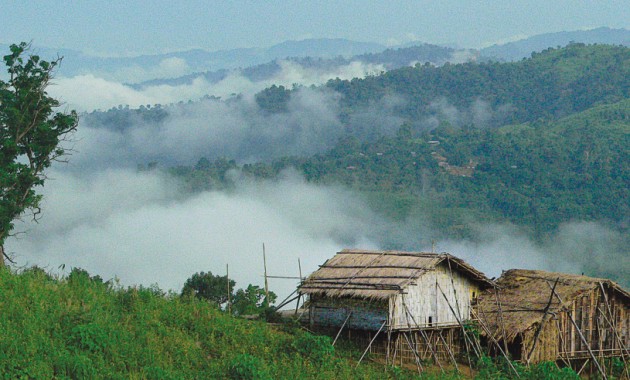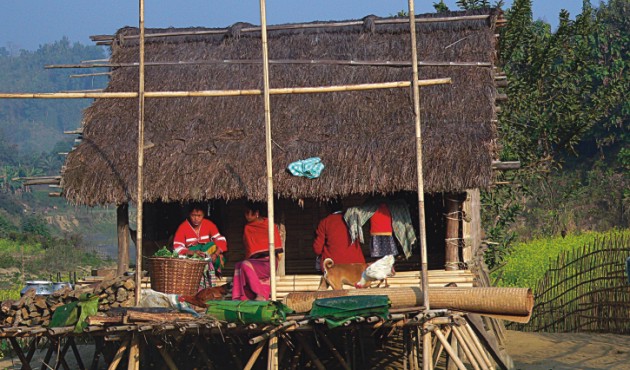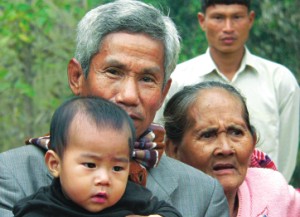| |
Multicultarising Secularism through Constitutional Recognition of
Adibashis
DEVASISH ROY WANGZA argues the case for recognition of Adibashis in the Constitution.

Photo: SUBRATA CHAKMA
The idyllic non-communalism
Thanks to the Supreme Court's judgment in the fifth amendment case, we are on board the ship of state, about to journey back to a secular Bangladesh. Anyone who believes in non-discrimination -- which is a peremptory norm of international human rights law -- cannot but be happy with this. We would, however, be living in a fool's paradise if we thought that we could return to that idyllic land that the framers of our Constitution dreamed of in 1972: a society free of "communalism (o-shamprodayikota) in all its forms" and one in which there is no "abuse of religion for political purposes" (original Article 12, Constitution of Bangladesh). Freedom from the various forms of 'communalism' (read racism) can only come if our Constitution not only gets back its stolen pillar of secularism, but is also supplemented with provisions that expressly, accurately and respectfully acknowledge the identities of the different peoples that have lived in Bangladesh since time immemorial.
Our secular heritage
No doubt, communalism -- or religion-based discrimination, or racism (especially where perpetrated through state power) -- was the greatest threat to social progress and democratic practices from 1947 to 1971, when we found ourselves huddled into the state of Pakistan, which had religious identity as its raison d'etre. Our tryst with 'Pakistanihood' was necessarily uncomfortable at best and stifling and oppressive at worst, because the legacy bequeathed to us by the forbears of our ancient heritage impelled us, as a society, to remain tolerant and multicultural. We could, and still do, recall the proud heritage of the multicultural and secular Bangladeshi rulers of the past: of the Buddhist Pala civilisation, the Hindu Sena rajas, the Muslim sultans and nawabs and Adibashi rajas and chiefs. Blood was spilt over land, wealth and people, but never over religion. The torch of secularism was carried, equally vigorously by so many of our poets and philosophers: from Lalon Fakir to Hasan Raja, Nazrul Islam to Shamsur Rahman.
From 1972 to 2010
However, the circumstances of 2010 are so very different to those of 1972, at least in some very fundamental respects. In 1972, we were trying to rid ourselves of the hangover of a religion-based identity that purported to subsume the cultural identities of the different peoples of Bangladesh. The medicine given was secularism. It did make sense in many contexts. Or so some would say. But where it concerned the identity of those peoples who now choose to call themselves Adibashi, it was regarded as assimilative. We may recall Manobendra Narayan Larma's one-man walkout from the Constituent Assembly in 1972, when his demands of multiculturism fell upon deaf ears. Larma rejected the Constitution because the national identity that was espoused in 1972 was monocultural; oriented around an identity based upon Bangaleeness, which again minoritised the indigenous peoples; this time on account of ethnicity and language, rather than religion (while in 1947, it was religion). But let me come to that later.
The challenge that we face in 2010 is that, while we still need to combat religious intolerance that stifles cultural expression, democratic practices and women's rights, our greatest nemesis is not a colonial state ruled by foreigners. Our nemesis now is the proverbial "shorshete bhoot" (the ghost in the mustard), of a homegrown variety, albeit with occasional foreign links and loyalties. However, if we pursue our non-communal ideals based upon a national identity that blindly espouses a monocultural Bangalee identity, we not only continue to do a great disservice to those citizens who are not ethnically, linguistically and culturally Bangalee (the Adibashis, primarily, and the far smaller number of Urdu-speakers)), we also risk incurring the wrath of those who feel insecure in a national identity that draws its values from a heritage that to them is insufficiently distinguishable from the identity of the similar cultural and ethnic groups that live across the international borders to our west and east. How then -- some would say -- do we assert our distinctiveness from the Bangalees of West Bengal and Tripura, and justify the partition of the then East Bengal from a united Bengal in 1905? What we therefore need to espouse is a national identity that asserts its uniqueness in positive terms, based upon the multicultural heritage of the peoples and communities of Bangladesh, and not an identity that focuses upon the non-Muslimness or non-Bangaleeness. This way we get out of the quagmire of the false dichotomy of Bangalee versus Muslim. In other words, what many in Bangladesh -- including Adibashis -- espouse is a multicultural state that discards the ideals of the Westphalian nation state as much as it rejects the medieval theocratic model of statehood.

Photo: DEVASISH ROY WANGZA
The Adibashi vision
The indigenous peoples of Bangladesh, including the Paharis of the Chittagong Hill Tracts (CHT) and the Adibashis of the plains regions, dream of a Bangladesh in which their distinctive identities are constitutionally recognised and protected. They wish to reshape the country so that they are a part of the structure and process of state-led governance and development instead of being mere spectators, or worse, victims. Apart from their cultural identities based upon strong collectivist traditions, their traditional dependence upon, and stewardship roles in managing, natural resources and eco systems, and self-governance and internal dispute resolution based upon customary law, indigenous peoples the world over share one historical experience: they are one segment of humanity that has had little or no role in designing the modern states' administrative architecture and resource ownership regimes. In other words, indigenous peoples did not frame the 'rules of the game' in the modern state (unlike in pre-modern indigenous civilisations like that of the Mayas, Aztecs, Kiratas, Sakyas, Boroks), and not unsurprisingly, remain among the most marginalised groups with regard to access to education, healthcare, drinking water (now a globally recognised human right), sanitation, electricity, communications, capital and market access. Therefore, in order to make the 'playing field' somewhat more 'level', indigenous peoples are demanding a say in state-led governance and development, in order to rid themselves of their subaltern status. Thereby, they are not seeking to hegemonise state power (a tall order, you might say, especially in states like Bangladesh, wherein they are not only microscopic minorities but are also socio-politically and economically disadvantaged) but are merely seeking a right to exist with their identities, and to be able to speak, and to be heard.
Constitutional recognition of Adibashis and safeguard provisions
Ever since 1972, Adibashis have been seeking constitutional recognition, something they lost in the constitutional reform processes of 1956, 1962 and 1972, wherein they were not consulted.
This is not to say that their status is not recognised by the Bangladeshi state today. In fact, their status as 'indigenous', 'aboriginal' and 'adibashi' is already recognised in several legal instruments, including the Chittagong Hill Tracts Regulation of 1900, the State Acquisition and Tenancy Act of 1950, the Finance Acts of 1995 and 2010, and in the Small Ethnic Groups Cultural Institutes Act of 2010 ("Khudro Nrigoshthhi Sanshkritik Protishthhan Ain", 2010). These laws are however deemed insufficient to protect their identity and rights because they are ordinary laws that often remain unimplemented or under-implemented and subordinated on the basis of the political exigencies of succeeding governing coalitions or on account of discrimination by state functionaries (whether based upon intolerance, bias or ignorance). At other times, legal provisions that contain safeguard measures are subject to constitutional challenges under threat of being declared ultra vires of the Constitution or otherwise illegal (as happened to the Regional Council Act of 1998, parts of the CHT Hill District Councils Acts of 1998 and parts of the CHT Regulation of 1900, on the ground that they violated the Equal Rights and Non-Discrimination clauses of the concerned constitutions). Thus Adibashis demand the recognition of their status as Adibashis, constitutional protection of safeguard measures like the aforesaid CHT laws of 1900 and 1998, and re-interpretation of the Equal Rights clauses to protect affirmative action measures that might otherwise be deemed unconstitutional. A mere reference to non-discrimination on the basis of "religion, race, caste, sex or place of birth' (Articles 28 and 29, Constitution of Bangladesh) was recently deemed, by a Division Bench of the High Court, to be insufficiently objective to accommodate affirmative action provisions for quotas for tribals in class III and class IV jobs in the hill district councils of the CHT! We thus need to spell out in unequivocal terms that procedural equality is not substantive equality and, that differing administrative measures to accommodate disadvantaged groups like Adibashis do not offend the spirit of non-discrimination.
Constitutional reforms for Adibashis would also help ensure that the protection of the identity and rights of Adibashis is part of the regular policy of the Bangladeshi state, as opposed to the fickle policies of successive governments with wavering levels of interest or apathy towards indigenous issues. Thus, after the hitherto repealed article on National Culture (article 9) is re-introduced, it is perhaps cogent to consider replacing the term "Bangalee Nationalism" with suitable alternative language.
 |
Photo: DEVASISH ROY WANGZA |
Recent initiatives for constitutional reform
The present Awami League-led government has been showing interest in incorporating measures to protect Adibashi interests. Leading members of parliament from the ruling Awami League, including Suranjit Sengupta (also the Co-Convenor of the Constitution Reforms Committee), Dipankar Talukdar (State Minister, Ministry of CHT Affairs) and Promode Mankin (State Minister for Culture), have openly announced their support for constitutional reforms on Adibashi issues, and have even referred to positive signals from none other than the prime minister herself! It is to be hoped that such expressions find fruition. Other Awami League and left-leaning party MPs who recently formed the Adibashi Parliamentary Caucus, including such respected political leaders as Rashed Khan Menon and Hasanul Haque Inu, have also added their voices for the Adibashi causes. Equally vociferous prominent civil society figures include Justice Golam Rabbani (retired), Advocate Sultana Kamal, Selina Hossain, Ajoy Roy and Abul Maksud, to name a few. Such dedicated individuals would surely not have supported the Adibashis' demands if there were any risks of compromising the interest of the people of Bangladesh.
Constitutional recognition as 'adibashi'
Despite the spate of positive interest mentioned above, the issue of 'adibashi' or 'indigenous' identity has also on occasion sparked controversy and sensitivity and given rise to misconceptions. This is perhaps grounded in the misplaced belief that constitutional recognition of adibashis as 'adibashi' would somehow compromise national unity and adversely affect the rights of citizens who are not Adibashi. Such fears are baseless and misconceived. Similar recognition of indigenous peoples has been provided in national constitutions in several countries of the world, including in Asia (Nepal, Malaysia, Indonesia and the Philippines, for example). In all of the aforesaid countries, such recognition has helped reduce discrimination and conflict, integrated indigenous peoples into the national 'mainstream' without artificially assimilating their identities and cultures, and promoted overall development and stability. Bangladesh would not be an exception to this trend.
International human rights standards and Adibashi rights
Constitutional recognition of Adibashis would also be in accordance with Bangladesh's international obligations under such global human rights instruments as the ILO's Indigenous and Tribal Populations Convention (No. 107) of 1957, the Convention on the Elimination of All Forms of Racial Discrimination, the International Covenant on Civil and Political Rights and the International Covenant on Economic, Social and Cultural Rights all of which have been ratified by Bangladesh. It would also be in tune with the spirit of the UN Declaration on the Rights Indigenous Peoples, which has been garnering growing support internationally, with even the few governments that opposed it in the UN General Assembly (USA, Canada, Australia and New Zealand) are now demonstrating a willingness to accommodate this document. This is the only international human rights instrument that was adopted with substantive indigenous participation, and with the free, prior and informed consent of indigenous peoples from all the continents.
Constitutional recognition: A just cause in the national interest
Constitutional recognition as Adibashi is a just and reasonable cause grounded in a desire to achieve appropriate status with which Adibashis may access their rights, without discrimination. The Adibashis are among the earliest inhabitants of the country. When they started their settlements in the areas that they now live, they did not displace the Bangalee people. No wonder they are called "adibashi" in Bengali, implying 'original inhabitant'. The Chakmas, Manipuris, Lushais, Santals and several other adibashi peoples resisted British colonisation by fighting against the colonisers with their meagre arsenals in the 18th and 19th centuries, as did Bangalees. The Adibashis supplied the much-need cotton to their Bangalee brethren from their jum (swidden) fields, when cotton imports from foreign countries were unheard of. They fought alongside Bangalees in the war of liberation. They protected, and still protect, much of the forest resources of the country. They sacrificed their lands to give electricity to the nation through the Kaptai Dam. They work in factories in Chittagong and Dhaka and have proved their contribution to the national economy. They have produced soldiers, policemen, diplomats and bureaucrats to protect the national interest. It is time that the historical wrongs are righted, at least in part, through constitutional amendments. This would help protect adibashi identity and rights, which are additionally threatened by globalised market capitalism. It would also promote national unity, integrity and stability, and enhance Bangladesh's international image in the comity of nations.
Devasish Roy Wangza is the Chakma Raja and Chief of the Chakma Circle in the Chittagong Hill Tracts, an advocate at the Supreme Court of Bangladesh and a member-designate to the UN Permanent Forum on Indigenous Issues.
|



